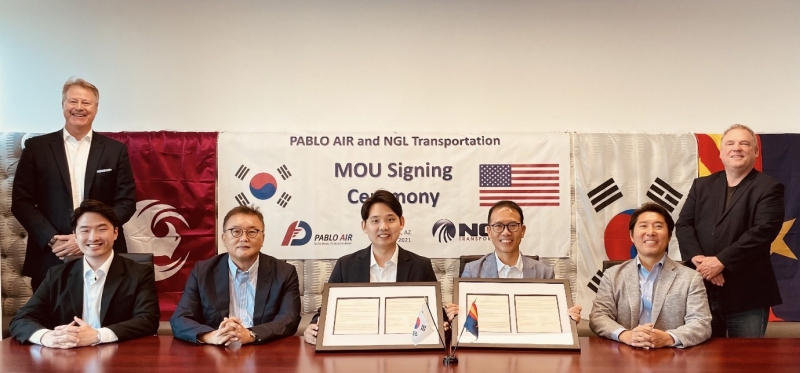PABLO AIR, a South Korean company specializing in drone logistics solutions and delivery services and a member of Born2Global Centre, has collaborated with local American companies to expand its business in drone delivery in the United States.
PABLO AIR has recently signed an MOU for strategic business alliance with local companies in Arizona.
PABLO AIR intends this MOU to advance its proprietary unmanned drone delivery system platform into the US market. PABLO AIR established its subsidiary after an invitation by the city office of Phoenix, Arizona in June, and is concentrating on securing partners for the local commercialization of its unmanned delivery operation.
The MOU includes three companies: NGL Transportation, an American logistics company whose customers include Walmart and Amazon; Delivery-EZ, a developer of unmanned home-delivery box systems; and Aerospace Arizona Association.
NGL Transportation, with its nationwide logistics network and fleet of over 250 trucks, is planning collaboration with PABLO AIR for drone related services on the first mile delivery. Delivery-EZ, is collaborating with PABLO AIR in developing an unmanned delivery station optimized for drones and an affordable mailbox. Aerospace Arizona Association will provide PABLO AIR with a local test bed and institutional support, including information on FAA flight regulations.
PABLO AIR has demonstrated its more differentiated competitiveness by successfully developing PAMNet, a smart mobility integrated logistics and delivery solution. PAMNet software controls unmanned mobility in drones, autonomous vehicles, and unmanned trucks in real time. It will be used in future unmanned delivery and logistics systems.
Kim Young-Joon, CEO of PABLO AIR, said,
“We plan to demonstrate PABLO AIR’s unique technology in the global market by implementing practical commercialization along with demonstration of delivery in the United States, for the first time as a Korean drone startup.” He added, “Afterwards, through continuous development, we will resolve difficulties related to long-distance delivery and the accessibility of existing delivery systems in logistics by raising the efficiency of various mobility vehicles, such as self-driving trucks and unmanned ground robots as well as delivery drones.”
Source: Press Release

